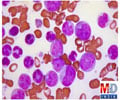New therapeutic targets and drugs that could benefit people with certain types of leukemia or blood cancer have been discovered by scientists.

According to Kapur, activating mutations of KIT receptors are almost always associated with a type of leukemia called mast cell leukemia. The mutations in the KIT receptor are found in about 90 percent of patients with this type of leukemia.
In addition, activating mutations of KIT are also exclusively associated with a subtype of acute myeloid leukemia known as core binding factor leukemia. When KIT is associated with these two types of leukemia, the survival rate for patients is profoundly reduced in comparison to patients who do not have this mutation.
Kapur said that his team identified two new targets in leukemic cells bearing this mutation, which when targeted or inhibited, cause leukemia cells to die.
The researchers discovered that the two targets are Rac GTPase and Pak (p21-activated kinase). In return, they designed a novel Rac inhibitor-EHop-016 -- that is considerably more potent than previously described inhibitors of Rac. They also demonstrated a novel role for Pak inhibition in leukemia using an existing Pak inhibitor.
The study has been published online in the Journal of Clinical Investigation.
Advertisement












